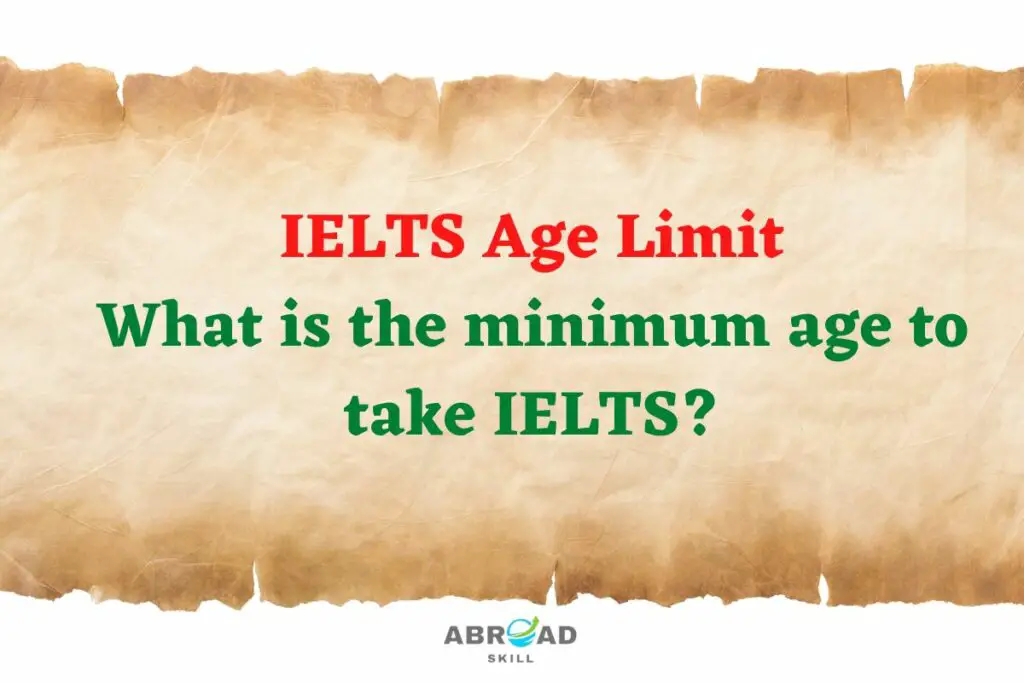IELTS is frequently used by students who want to study, work, or settle in another country. Even though the examination regulations are quite straightforward, candidates may have queries, one of which is whether there are any age restrictions for taking the IELTS.
As per the official IELTS site “IELTS is made available worldwide to all persons, regardless of age, gender, race, nationality or religion but it is not recommended to persons under 16 years of age”. So there is no upper age limit for taking the IELTS exam; you can take it at any age.

Let’s take a look at some of the most crucial variables of age to consider when taking IELTS.
What is the minimum age to take the IELTS?
The IELTS exam requires a minimum age of 16 years. Anyone above the age of 16, regardless of nationality or background, can take the IELTS Test. There may be exceptions when the school demands an IELTS score for admission. The IDP and British Council, the agencies that administer this exam, has set no age limit or eligibility criterion, but it is suggested that the applicant be at least 16 years old.
This minimum age requirement is in effect since youngsters complete their 10th grade between the ages of 15 and 16. Only if a pupil intends to pursue higher secondary education should they take IELTS at the age of 16. The validity of IELTS is two years, and because the test is primarily used for students seeking to enter university or obtain a skills visa to immigrate, which normally occurs at the age of 18, taking the test at the age of 16 or under would be ineffective. If a candidate is 16 or older, they are not required to be accompanied by a guardian for both computer-based IELTS and pen and paper-based IELTS.
The rule is different for the IELTS indicator test, which is taken by 16-17-year-olds. They require parental permission to record the test taker’s video/audio during the Listening, Reading, and Writing examinations for proctoring, as well as the presence of a chaperone during the live video Speaking test session for supervision. The parent/legal guardian can provide this consent and nominate chaperones by completing a signed consent form and submitting it at least 48 hours before the test date. The IELTS Indicator test is not available to students under the age of sixteen.
Is it possible to take the IELTS exam before the 12th grade?
In two instances, you can take the IELTS exam before your 12th grade. One is that if you plan to graduate abroad, you can take the IELTS while still in 11th or 12th grade. Since the validity period for IELTS is two years, writing it sooner would not be a waste of time. Another scenario is when you intend to continue your higher secondary education beyond the tenth grade in a foreign school. If you are at least 16 years old, you can take the IELTS and attend any foreign school for your 11th and 12th grades.
Keep in mind that each country’s rules for allowing immigrant students for higher secondary education differ. Some countries, such as Canada, may compel underage student to be accompanied by a guardian until they complete their education. If you intend to enrol, you should familiarise yourself with both the immigration requirements and the school policies.
Who is eligible to take the IELTS exam?
The IELTS governing bodies have not established any minimum eligibility criteria for taking the exam, and it is not restricted to any certain gender, race, nationality, or religion. Any applicant who intends to migrate to or further their education in an English-speaking country is eligible to take the exam.
Candidates are recommended, however, to examine the eligibility conditions imposed by their educational institution or organisation, as your age may affect the purpose for which you write the exam.
Let us look at the age restrictions for the two main reasons people take IELTS.
1. Age limit for Study Visa purposes
The majority of IELTS candidates intend to study abroad. The age limit for admission to a course is primarily determined by the college’s policy. You might also expect questions from an immigration officer based on your age while your visa is being processed. Consider the following study-abroad destinations and their age requirements:
The United Kingdom
When it comes to studying abroad, the United Kingdom has the most lax regulations. The tier 4 (General) student visa will be issued without regard to your age, as the only basic criteria for applying for a study visa is that you be at least 16 years old. There are no stated upper age limits for study purposes. In truth, several UK universities welcome students who were unable to continue their education owing to personal circumstances by taking into account their experience, paid or voluntary, and skills.
If you have a significant gap in your education, you must present valid explanations for this gap, both in your statement of purpose and during the immigration interview. Most institutions accept a three to four-year gap in education without inquiry, but a gap of more than five years in the study must be justified. The same is true for applicants over the age of 40, whose applications may be scrutinised more closely.
Canada
Canada does not have an upper age limit, as a rule, however, it is frequently observed that many reputable educational institutions do not normally issue study visas to candidates with more than a 5-year study gap; nonetheless, a 2-to-5-year gap is acceptable. A study gap occurs when you are not enrolled in any educational programme. To study in Canada as an International student, you must be at least 18 years old. If you intend to continue your education after completing your 10th grade in Canada, you will need a study permit. The majority of schools require a guardian to accompany students who want to study in Canada after the 10th grade, although some do not.
However, if you can demonstrate that you have the necessary skills for the course, you may be admitted. This can be accomplished by drafting an impressive statement of purpose that includes why you choose the specific course as well as relevant prior studies or professional experience. Another option to overcome the study gap problem is to take short courses as an adult student, even if they are online, as this will allow you to demonstrate that you were active in some learning process throughout your gap years.
Australia
In Australia, there are no restrictions on the maximum age for enrolling in a programme. If you are under the age of 18 and want to study in Australia, you will need to provide additional documentation. When applying for an Australian Student Visa, you must preserve necessary documents such as a valid passport, a completed application, and your enrollment letter from the relevant university.
Students must meet distinct admissions criteria at each Australian university in order to get admitted to any of them. Along with the other criteria, there is a gap criterion. While some universities will accept students with a three-to-four-year hiatus in their studies, others would not accept students with a two-year absence. The acceptability of the gap is also affected by whether you want to take an undergraduate or postgraduate programme in Australia.
The United States of America
The best part of studying at a university in the United States is that there are no age restrictions. Yes, they accept international students between the ages of 14 and 79. However, most top-tier universities would not admit you if you have had a long gap year.
A year’s gap is usually acceptable in the United States. If a student has taken a year off, he should be able to provide sufficient proof to defend his decision. If a student dropped out of college or took a study break due to medical issues, they must provide medical documentation. Some students who have worked or interned need to provide experience letters. Students who have taken up hobbies or volunteer activities must provide confirmation of their participation.
Germany
Germany is a popular choice for candidates because the education is of excellent quality and inexpensive. In Germany, there is no minimum age for pursuing higher education. However, depending on the programme, there may be an upper age limit. It is tough to obtain a study visa for a master’s programme if you are above the age of 30, although MBA students as old as 40 are admitted.
Germany will also allow gap years if verification of what the candidate did during the study gap period is supplied. Typically, a 5-year gap is accepted for engineering courses, whereas a 3-year delay is accepted for medical courses. Some institutions will even accept a gap of 6-7 years provided the rationale aligns well with your portfolio and what you want to deliver to their educational institution to help them improve their quality.
2. Age limit for Permanent Residency
The age restriction for applying for permanent residency varies by nation. Only Canada and Australia currently allow straight Permanent Residency applications. The minimum age to apply for PR in Canada is 18 years old, while the maximum age limit is 35 years. The lowest age limit in Australia is also 18 years, however, the maximum age limit is 55 years. For each of these countries, there may be exceptions and age relaxation based on a variety of reasons.
You can check the immigration Australia website to know more
to know more
You can check the Canada Official website to know more
to know more

